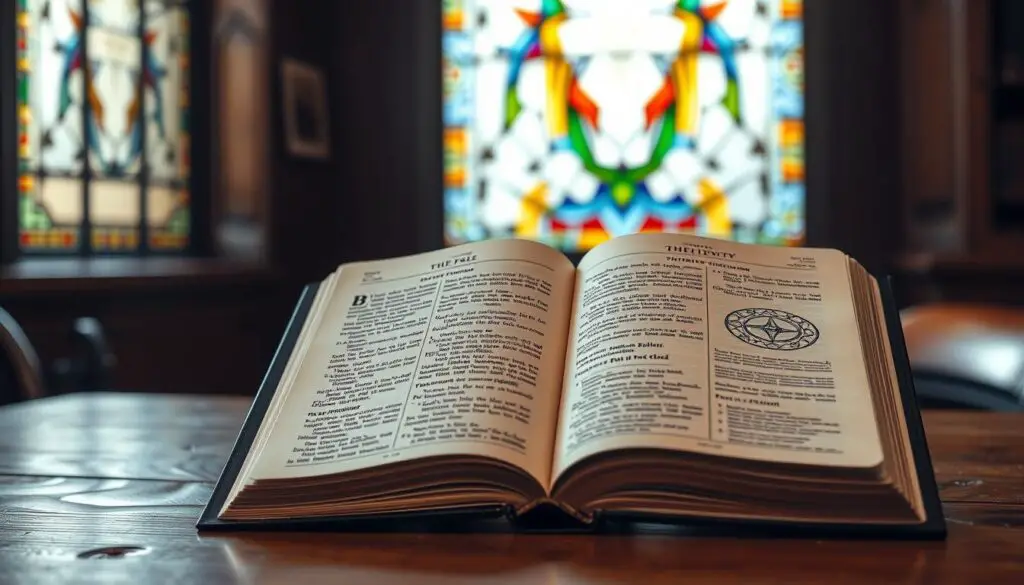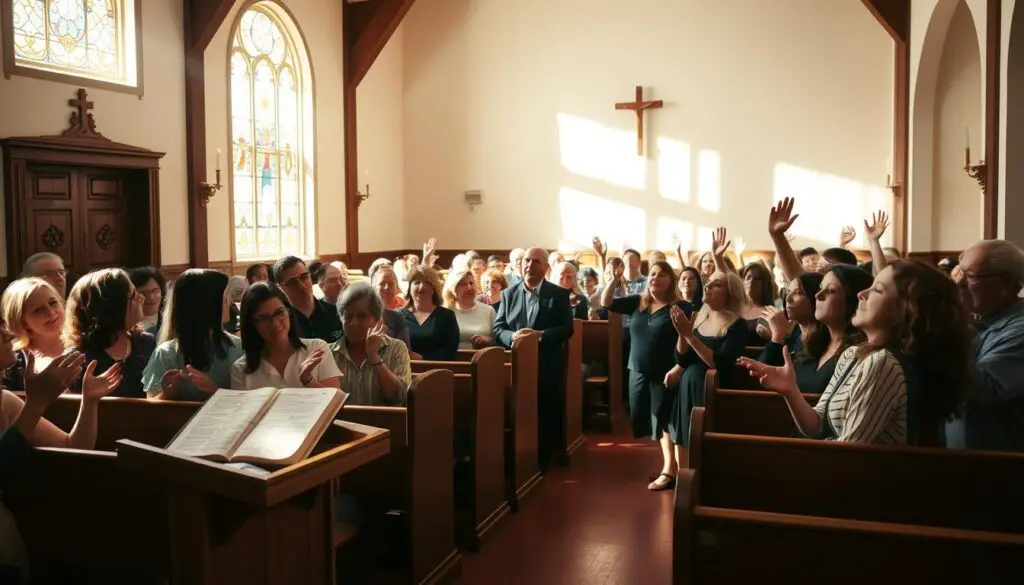What makes a religious group stand out in a crowded spiritual landscape? For the Free Baptists, the answer lies in their unwavering commitment to individual choice and inclusive theology. Rooted in 18th-century New England, this denomination balances deep doctrinal traditions with practical, everyday values.
Central to their identity is the idea that salvation is available to all through grace, not predetermined fate. Early leaders like Benjamin Randall championed this view, arguing that every person has the authority to accept or reject divine love. This belief shaped the church’s focus on community outreach and personal accountability.
Unlike stricter denominations, Free Baptists emphasize free agency—the power to shape one’s spiritual path. Their teachings blend scriptural rigor with compassion, creating a faith that values both doctrine and lived experience. From Sunday services to neighborhood initiatives, their practices reflect a desire to serve others without judgment.
Today, the church remains anchored in humility and service. Members often describe their worldview as “heavenly-minded but earthly-good,” merging reverence for scripture with a hands-on approach to improving the world. Whether through charity work or worship, their mission stays clear: to honor faith while uplifting people.
Key Takeaways
- Free Baptists prioritize personal choice in matters of salvation and spiritual growth.
- Benjamin Randall played a key role in shaping the denomination’s early principles.
- The church teaches that grace is freely available to everyone, regardless of background.
- Their doctrine balances theological depth with practical, community-focused values.
- Service and humility remain central to the Free Baptist way of life.
Historical Background and Roots
How did a movement emphasizing spiritual independence take shape in colonial America? The answer lies in the fiery sermons of traveling preachers and the courage of early reformers. By the late 1700s, religious revivalism swept through New England, challenging rigid doctrines with a message of accessible grace.
Origins and Early Influences
George Whitefield’s revivals sparked a hunger for faith rooted in personal experience rather than strict rules. This energy birthed the term “Free Wills” in 1780—a bold declaration that salvation wasn’t limited to a chosen few. Northern congregations focused on communal accountability, while southern groups leaned into individual conversion stories.
Benjamin Randall and the Rise of Free Baptists
Benjamin Randall transformed these ideas into action. After a life-changing spiritual awakening, he preached that grace wasn’t earned but freely given. His sermons attracted farmers, tradesmen, and thinkers tired of distant religious hierarchies.
Debates raged about whether believers could lose their salvation. Randall argued that human responsibility mattered as much as divine love. This balance between divine power and earthly choice became the church’s heartbeat—a rhythm still felt in modern Free Baptist communities.
Core Doctrines and Theological Distinctions
What defines a faith community more than its foundational teachings? For this denomination, clarity on spiritual matters comes through three pillars: human agency, divine generosity, and accessible redemption. These principles shape a theology that values both divine power and human participation.
Free Will, Free Grace, and Free Salvation
The church’s teachings rest on the idea that every person can respond to spiritual truth. Unlike groups that emphasize predestination, they teach that grace is an open invitation—not a limited resource. This aligns with their view of Jesus Christ’s sacrifice as sufficient for all, not just a select few.

Members often describe their doctrine as “divine partnership.” God initiates salvation through grace, but individuals must actively receive it through faith. This balance avoids extremes—salvation isn’t earned by works, nor is it forced upon anyone.
Balanced Theology and Apostasy Considerations
How does the church handle the risk of abandoning faith? Leaders stress that while salvation is secure, it requires ongoing commitment. “Eternal security exists,” one pastor notes, “but so does human responsibility to persevere.”
This perspective rejects two extremes: the idea that salvation can’t be lost no matter what, and the notion that believers must constantly “re-earn” God’s favor. Instead, they emphasize daily faithfulness as evidence of genuine transformation. It’s a practical approach—rooted in scripture yet mindful of real-world struggles.
Understanding the original free will baptist beliefs
How do faith traditions maintain relevance across generations? For this community, the answer lies in teachings that blend timeless truths with practical guidance. Their approach to scripture emphasizes clarity and personal application, creating a framework adaptable to modern life.
Defining Unique Doctrinal Elements
Central to their identity is the conviction that spiritual growth requires active participation. Unlike groups that prioritize divine sovereignty alone, they teach that human responsibility shapes one’s journey. “Grace opens the door,” explains Pastor Marie Ellis, “but each person must choose to walk through it.”
This focus on choice extends to their view of scripture. Leaders emphasize a plain reading of biblical texts, avoiding overly symbolic interpretations. For example, salvation is seen as available to all—not limited by predestination—but requires continual commitment.
| Doctrinal Element | Free Baptists | Many Churches |
|---|---|---|
| Human Agency | Essential for salvation | Often secondary |
| Scriptural Interpretation | Literal and practical | Varied approaches |
| Community Role | Shared accountability | Individual focus |
These distinctions help members address contemporary issues while honoring tradition. When facing ethical dilemmas, they turn to scripture first—not cultural trends. This balance allows them to engage society without compromising core values.
Their practices also reflect this uniqueness. Weekly gatherings prioritize collective prayer and mutual encouragement, fostering resilience in challenging times. By merging doctrinal depth with relational warmth, they create spaces where faith thrives.
Key Ordinances and Worship Practices
How do sacred rituals shape a community’s identity? For this church, three symbolic acts—baptism, communion, and foot washing—anchor their spiritual life. These practices aren’t empty traditions but vivid expressions of their core teachings.

Each ordinance bridges ancient scripture with modern devotion, offering tangible ways to live out faith.
Baptism and the Lord’s Supper: Symbols of Renewal
Believer’s baptism marks a public declaration of new life. Members describe it as “dying to old ways” and rising with Jesus Christ’s resurrection power. Unlike infant christenings, this act follows a personal decision to embrace salvation.
The Lord’s Supper reinforces communal bonds. Bread and cup serve as reminders of sacrifice: “This isn’t just a memorial,” explains Deacon Harris. “It’s a moment to recommit to serving others.” Shared monthly, it unites the church across generations.
Washing the Saints’ Feet as a Model of Humility
This lesser-known practice roots the community in humility. Inspired by Christ washing His disciples’ feet, members pair up to wash each other’s feet. “Kneeling before another person strips away pride,” says Pastor Linda Mills. “It reminds us that leadership means serving.”
- Baptism: Celebrates individual choice and spiritual rebirth
- Communion: Strengthens unity through shared remembrance
- Foot Washing: Embodies servant leadership for all men and women
Together, these acts weave doctrine into daily life. They turn abstract ideas like grace and free will into lived experiences—proof that ancient truths still transform modern hearts.
Contemporary Impact and Blue-Collar Heritage
How does a faith community stay grounded in modern times? For Free Baptists, the answer lies in their blue-collar roots and commitment to timeless values. Their identity remains tied to hard work, neighborly care, and scripture-based living.
Conservative Values and Cultural Identity
This church thrives where faith meets action. Many congregations gather in rural towns or urban neighborhoods where members fix cars, teach school, or farm land. “We’re ordinary people serving an extraordinary God,” says mechanic and deacon Carl Whitaker. Their doctrine emphasizes practical holiness—honesty in business, fidelity in marriage, and generosity to strangers.
Local churches often operate food pantries or repair homes for widows. These efforts reflect their belief that grace isn’t just preached but lived. The American Association of Free Baptists supports these initiatives through training and resources while preserving their distinct name and mission.
Local and Denominational Associations
Regional fellowships like the Ohio State Association host summer camps and vocational workshops. These events strengthen bonds between free baptists across states while teaching skills from woodworking to financial stewardship. “Our faith shapes how we work,” explains teacher Martha Cole. “Every job becomes a chance to honor Christ.”
National partnerships focus on disaster relief and church planting. Volunteers rebuild homes after hurricanes or mentor new congregations in growing cities. Through it all, the authority of scripture guides decisions. As Pastor Tim Reid notes, “The Bible isn’t just our guidebook—it’s our blueprint for building up both man and community.”
Conclusion
In a world of shifting spiritual trends, Free Baptists stand firm through timeless principles. Rooted in 18th-century revivals, their blend of scriptural authority and human responsibility continues to guide communities today. Historical figures like Benjamin Randall laid foundations emphasizing grace for all—a doctrine that still shapes worship and service.
The church’s identity thrives where blue-collar values meet sacred tradition. From baptism symbolizing rebirth to foot washing modeling humility, practices bridge ancient texts with modern life. Local congregations prove faith isn’t just taught but lived through food pantries and disaster relief.
Every man holds the power to explore these teachings, finding guidance in their balance of divine truth and earthly action. Scripture remains the unchanging core, reinforcing the church’s enduring mission. Their story invites deeper study—not as relics of the past, but as living proof that steadfast convictions shape tomorrow.
FAQ
Who was Benjamin Randall, and why is he important to Free Will Baptists?
Benjamin Randall founded the Free Will Baptist movement in 1780, emphasizing free grace and the belief that salvation is available to all. His teachings rejected strict Calvinist predestination, shaping the denomination’s focus on personal choice and spiritual accountability.
How do Free Will Baptists view free will compared to other Baptist groups?
They stress that every person can accept or reject God’s grace, contrasting with groups that teach predestination. This belief in human agency aligns with their doctrine of free salvation, rooted in Christ’s sacrifice and resurrection.
Do Free Will Baptists believe someone can lose their salvation?
Yes. They teach that apostasy is possible if someone turns away from faith. This reflects their balanced view of God’s grace and human responsibility, urging believers to actively nurture their spiritual life.
Why is washing the saints’ feet practiced in some Free Will Baptist churches?
This ordinance symbolizes humility and service, following Jesus’ example in John 13. It reinforces community bonds and reminds members to live with compassion, though not all congregations observe it today.
How do Free Will Baptists engage with modern cultural issues?
Many uphold conservative values, prioritizing biblical authority on topics like family and morality. Their blue-collar roots often shape a practical, community-focused approach to ministry and outreach.
What role do local churches play in Free Will Baptist governance?
Congregations operate independently but collaborate through associations like the National Association of Free Will Baptists. This structure balances local autonomy with shared missions and doctrinal unity.
How does the resurrection of Jesus Christ shape their theology?
The resurrection is central, affirming victory over sin and death. It underpins hope for eternal life and motivates believers to share the Gospel, reflecting Christ’s transformative power.
Are Free Will Baptists part of a larger denominational network?
Yes. Groups like the Original Free Will Baptist Convention connect churches for missions, education, and resource sharing, preserving their heritage while adapting to contemporary needs.